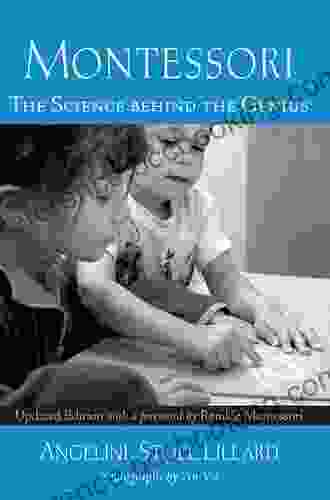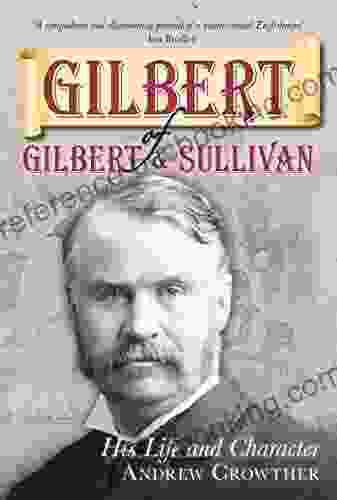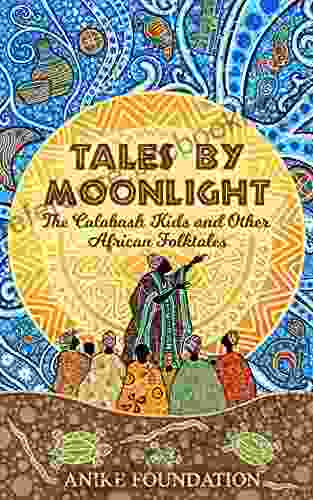Montessori: The Science Behind the Genius

Unveiling the Secrets of a Revolutionary Educational Approach

4.8 out of 5
| Language | : | English |
| File size | : | 29436 KB |
| Text-to-Speech | : | Enabled |
| Screen Reader | : | Supported |
| Enhanced typesetting | : | Enabled |
| Word Wise | : | Enabled |
| Print length | : | 492 pages |
| Lending | : | Enabled |
In the realm of early childhood education, the Montessori method stands as a beacon of innovation, inspiring educators and parents alike for over a century. Its founder, Maria Montessori, was a visionary physician and educator who dedicated her life to understanding the unique developmental needs of children.
Her revolutionary approach, grounded in scientific observation and research, has revolutionized the way we think about early childhood learning. Montessori believed that children have an "absorbent mind," capable of effortlessly absorbing knowledge from their environment. Her method provides a nurturing and stimulating environment that allows children to explore, experiment, and learn at their own pace.
Scientific Basis of Montessori Principles
Far from being merely a collection of educational techniques, the Montessori method is rooted in a solid scientific foundation. Montessori's principles are supported by extensive research in fields such as neuroscience, psychology, and child development.
1. Sensitive Periods:
Montessori identified specific "sensitive periods" during which children are particularly receptive to learning certain skills. For example, the sensitive period for language development occurs between birth and age 6, making it the ideal time to expose children to rich language experiences.
2. Prepared Environment:
The Montessori classroom is meticulously designed to foster children's independence and self-discovery. It is a "prepared environment" that provides a wide range of developmentally appropriate materials that encourage children to explore and learn from their mistakes.
3. Hands-On Activities:
Montessori believed that children learn best through hands-on experiences. Her method emphasizes practical activities that engage multiple senses and promote problem-solving skills. These activities may include manipulating puzzles, pouring liquids, or caring for plants.
4. Self-Directed Learning:
In a Montessori classroom, children are encouraged to choose their activities and work at their own pace. This self-directed learning approach nurtures children's intrinsic motivation and fosters a lifelong love of learning.
Benefits of Montessori Education
The scientific basis of the Montessori method translates into numerous benefits for children:
1. Cognitive Development:
Montessori activities stimulate cognitive development by encouraging children to think critically, solve problems, and develop a deep understanding of concepts.
2. Emotional Development:
The Montessori method promotes emotional development by providing a safe and supportive environment where children can develop self-confidence, independence, and empathy.
3. Social Development:
Montessori classrooms are collaborative spaces where children learn to interact with others, resolve conflicts peacefully, and develop a sense of community.
4. Academic Success:
Research has consistently shown that children who attend Montessori schools perform better academically in later years, particularly in areas such as reading, math, and critical thinking.
'Montessori: The Science Behind the Genius' is an invaluable resource for anyone interested in unlocking the potential of every child. This comprehensive guide delves into the scientific foundation behind Montessori's principles, providing parents and educators with a roadmap to nurture the innate genius within each child. By embracing the Montessori approach, we can create a world where every child has the opportunity to reach their full potential and become a lifelong learner.
4.8 out of 5
| Language | : | English |
| File size | : | 29436 KB |
| Text-to-Speech | : | Enabled |
| Screen Reader | : | Supported |
| Enhanced typesetting | : | Enabled |
| Word Wise | : | Enabled |
| Print length | : | 492 pages |
| Lending | : | Enabled |
Do you want to contribute by writing guest posts on this blog?
Please contact us and send us a resume of previous articles that you have written.
 Book
Book Novel
Novel Page
Page Chapter
Chapter Text
Text Story
Story Genre
Genre Reader
Reader Library
Library Paperback
Paperback E-book
E-book Magazine
Magazine Newspaper
Newspaper Paragraph
Paragraph Sentence
Sentence Bookmark
Bookmark Shelf
Shelf Glossary
Glossary Bibliography
Bibliography Foreword
Foreword Preface
Preface Synopsis
Synopsis Annotation
Annotation Footnote
Footnote Manuscript
Manuscript Scroll
Scroll Codex
Codex Tome
Tome Bestseller
Bestseller Classics
Classics Library card
Library card Narrative
Narrative Biography
Biography Autobiography
Autobiography Memoir
Memoir Reference
Reference Encyclopedia
Encyclopedia Alex Trenoweth
Alex Trenoweth Allen N Mendler
Allen N Mendler Andy Whyte
Andy Whyte Amelia Klem Osterud
Amelia Klem Osterud American Sociological Association
American Sociological Association Andrew Beyer
Andrew Beyer Amanda Lash
Amanda Lash Amanda Lawrence
Amanda Lawrence Andrew Stellman
Andrew Stellman Allan Mason
Allan Mason Amanda Bjerkan Hennessy
Amanda Bjerkan Hennessy Allan Odden
Allan Odden Alex Tremm
Alex Tremm Alice Pung
Alice Pung Angela Rizza
Angela Rizza Angela Pepper
Angela Pepper Andrea Fazzari
Andrea Fazzari Andrew Pickering
Andrew Pickering Andie Andrews
Andie Andrews Angie Klink
Angie Klink
Light bulbAdvertise smarter! Our strategic ad space ensures maximum exposure. Reserve your spot today!

 Clarence MitchellElevate Your Dance Through Divine Connection: The Ultimate Prayer Handbook...
Clarence MitchellElevate Your Dance Through Divine Connection: The Ultimate Prayer Handbook... Isaac MitchellFollow ·17.4k
Isaac MitchellFollow ·17.4k Darren NelsonFollow ·10.4k
Darren NelsonFollow ·10.4k Eugene ScottFollow ·8.3k
Eugene ScottFollow ·8.3k Edward ReedFollow ·19.4k
Edward ReedFollow ·19.4k Doug PriceFollow ·9.3k
Doug PriceFollow ·9.3k Robert HeinleinFollow ·14.6k
Robert HeinleinFollow ·14.6k Branson CarterFollow ·4.8k
Branson CarterFollow ·4.8k Benjamin StoneFollow ·2.2k
Benjamin StoneFollow ·2.2k

 Julio Cortázar
Julio CortázarIf You Don't Do Politics, Politics Will Do You
Uncover the Hidden Power in Everyday Life In...

 Ivan Turner
Ivan TurnerThe Edge of Physics: Unraveling the Extraordinary...
What is the nature of...
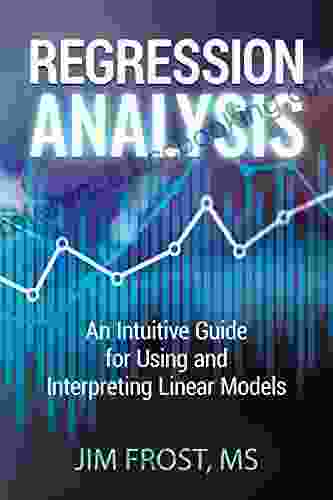
 Diego Blair
Diego BlairAn Intuitive Guide For Using And Interpreting Linear...
Linear models...
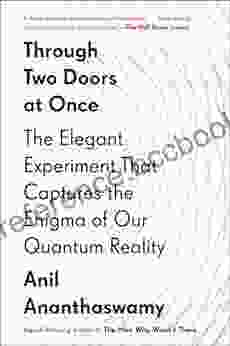
 Oscar Wilde
Oscar WildeThrough Two Doors At Once: Unveiling the Enigmatic World...
Prepare to delve into the captivating realm of...

 Darrell Powell
Darrell PowellWomen Athletes in History: An Inspiring Gift for Teenage...
Unveiling the Extraordinary Stories of Female...
4.8 out of 5
| Language | : | English |
| File size | : | 29436 KB |
| Text-to-Speech | : | Enabled |
| Screen Reader | : | Supported |
| Enhanced typesetting | : | Enabled |
| Word Wise | : | Enabled |
| Print length | : | 492 pages |
| Lending | : | Enabled |


